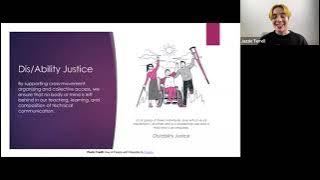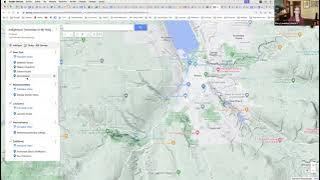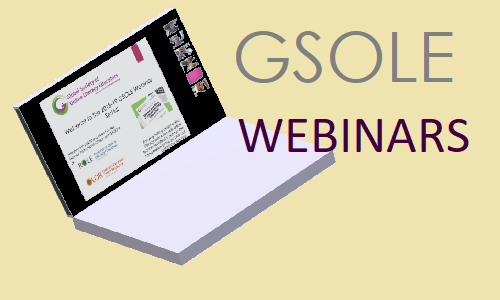- Home
- Programs
- 2025-2026 Webinar Series
- 2023-2024 Webinar Series
Listings of Past Webinar SeriesThe listings below document the efforts of past webinar leaders, as well as the evolving interests of online literacy educators. Members may watch recorded webinars by clicking on the image accompanying each listing. |
|
Webinar Descriptions |
 Fundamentals of Learning Experience Design (LXD): Creating Accessible and Engaging Classroom Space
Fundamentals of Learning Experience Design (LXD): Creating Accessible and Engaging Classroom Space
Webinar Leaders: Jessie Borgman and Casey McArdle
Date of Webinar: June 7th, 2024
Overview
In 2015, Potts, et. al. wrote about the creation of the Experience Architecture program at Michigan State University, where they stated their goal was to teach how we can become “architects of digital experiences” and “positively influence the ways in which we have traditionally built products and services by focusing on human experience first instead of technology.” In 2009, Jesse James Garrett noted that “Experience Design is the design of anything independent or across media with human experience as the explicit outcome and human engagement as the explicit goal” (qtd. in Cummings, 2009). Garrett constructs a bridge between experience and engagement for learning experience designers to begin to think beyond just student experience with course content, but also student engagement.
Our workshop will focus on these concepts of being an architect of digital experiences and constructing bridges that keep content and human experience and engagement as the goal. In keeping this focus, we will begin with a discussion of definitions and terminology to orient attendees to the language and systems that exist within Learning Experience Design (LXD), Experience Architecture (XA), and accessibility. We will explore the breakdown of LXD and User Experience (UX) under the umbrella of Experience Architecture and how these roles can exist and thrive within academic spaces. The workshop will also connect LXD to engagement in terms of getting students to engage with course content and learning outcomes. We will help our attendees understand and explore how engagement gets people to stay, learn, focus, and connect.
Participants will:
- Practice the creation of engagement focused student-centered learning experience
- Understand LXD, its origins, and its role in educational engagement spaces
- Understand basic LXD principles that can be applied to course design (activities, assignments, syllabi, etc.)
- Understand of how to create meaningful educational experiences that engage learners
Webinar Leader Bios
Jessie Borgman and Casey McArdle are leaders in online writing instruction, distance education, and user experience research. They are also founding members of GSOLE. Together, in 2015, they co-created a resources website and community for online writing instructors called The Online Writing Instruction Community (www.owicommunity.org). They have co-authored three books based on their PARS (personal, accessible, responsive, strategic) framework: 2019’s Personal, Accessible, Responsive, Strategic: Resources and Strategies for Online Writing Instructors (winner of the 2020 Computers and Composition Distinguished Book Award), 2021’s PARS in Practice: More Resources and Strategies for Online Writing Instructors, and 2023’s PARS in Charge: Resources and Strategies for Online Writing Program Leaders. They host workshops on online writing instruction and creating and managing accessible online courses and programs. They are available for hire through their online form: https://www.owicommunity.org/work-with-us.html
Students in the Driver's Seat of Course Design:
Branching Scenarios in Online Writing Instruction
Writing Instruction
Webinar Leaders: Tiffany Bourelle, Mitch Marty, Joseph Bartolotta
Date of Webinar: April 26th, 2024
Overview
This webinar will introduce participants to an active-learning strategy called “Branching Scenarios,” which challenge students by offering them various learning paths for composing a project. For instance, students are provided a writing assignment, given two rhetorical situations from which they can choose, and are prompted to choose the branch or path that best fits their learning styles and choice of audience, purpose, and medium for their chosen rhetorical situation. Whereas most instructional design or user-centered scholarship in online writing instruction focuses on instructors controlling the design of a course, Branching Scenarios insist that students become active participants in the design process. To model this approach, we’ll present a course module where students are provided an assignment that offers choices of rhetorical situation, various discussion boards based on their choices, and small-stakes activities based on their chosen medium for communication. We’ll then guide participants in brainstorming what assignment can work best for a scenario in their own courses and in thinking through what choices students can make along the process path of learning and creating the project. Participants will leave with an action plan and one scenario drafted to begin working in their courses.Participants will:
- Understand the philosophy behind Branching Scenarios as they relate to Online Writing Instruction.
- Consider how Branching Scenarios align with PARS (Personal, Accessible, Responsive, and Strategic) course design.
- Discover how Branching Scenarios can be developed with Backwards Course Design to address the Student Learning Outcomes of an online-based writing course through a module designed by the attendees.
- Learn how to deploy a Branching Scenarios activity in their own course by using basic tools in an LMS and through Storyline, a common software program used to develop Branching Scenarios.
Webinar Leader Bios
Dr. Joseph Bartolotta is an Associate Professor of Writing Studies and Rhetoric at Hofstra University. He holds a PhD in Rhetoric & Scientific and Technical Communication from the University of Minnesota.
Mitch Marty is a writer and photographer from rural Wisconsin, who teaches as an Adjunct Professor with the Department of English and works as an Instructional Designer with the Center for Teaching & Learning at the University of New Mexico. He has an MFA in Creative Writing from the University of New Mexico.
Tiffany Bourelle teaches multimodal composition and professional writing at the University of New Mexico (UNM). Her work focuses on enhancing pedagogy through multimodal composition in face-to-face and online formats. She created and oversees an online writing program called eComp at UNM, and has been published in such journals as Computers and Composition, The Journal of Technical Writing and Communication, Technical Communication Quarterly, and WPA: Writing Program Administration.
 Reimagining Online Technical Writing: Feminist, Disability, and Transnational Perspectives in UX/UI Design
Reimagining Online Technical Writing: Feminist, Disability, and Transnational Perspectives in UX/UI Design
Webinar Leaders: Jazzie Terrell
Date of Webinar: January 26th, 2024
Overview
'Reimagining Online Technical Writing: Feminist, Disability, and Transnational Perspectives in UX/UI Design,' aims to revolutionize instructional design, emphasizing inclusivity and global awareness. Aligning with the 'Instructors as Designers: Considering UX Design in OWI' series, it introduces innovative approaches from feminist, disability, and transnational studies to enhance UX/UI design in online technical writing. The session explores the challenges of integrating disability considerations into digital environments, highlighting the need for adaptable, evolving design solutions rather than fixed ones. Participants will actively deconstruct and analyze existing online platforms, applying feminist, disability, and transnational perspectives. This critical analysis aims to identify areas for design improvement. Interactive exercises include hands-on redesign tasks, focusing on technical writing assignments to apply these perspectives practically. Breakout sessions will facilitate discussions on incorporating feminist principles in UX/UI design. The webinar aims to cultivate a comprehensive design thinking approach, recognizing the synergy between feminist, disability, and transnational aspects in UX/UI design. Educators will leave with actionable strategies to create more inclusive and equitable online courses. Emphasizing the importance of challenging standard design assumptions, the webinar aims to inspire an inclusive mindset, transforming the educational landscape. Post-webinar, an online forum will provide a platform for continued discussion, sharing successes, and furthering the development of inclusive technical writing education.Participants will:
- Development of a Holistic Design Thinking Mindset: Attendees will learn to integrate feminist, disability, and transnational perspectives in UX/UI design, fostering a comprehensive understanding of how these dimensions intersect and influence online technical writing.
- of Practical Design Strategies: Educators will gain actionable techniques and strategies to adapt and enhance their online technical writing courses, promoting greater inclusivity and equitable student engagement.
- an Inclusive Design Approach: The webinar will encourage participants to critically assess and question default design assumptions, fostering an inclusive mindset that is essential for reshaping the educational landscape.
- Establishment of a Collaborative Community of Practice: A post-webinar online forum will facilitate ongoing dialogue and collaboration, allowing participants to share implementation successes and collectively advance the field of inclusive technical writing instruction.
Webinar Leader Bios
Jazzie Terrell (they/them/elle) is a skilled researcher focusing on communal, activist, feminist rhetoric, disability studies, and gender/women's studies. Their expertise includes mixed-methods data analysis, archival research, sociocultural rhetorical praxis, and queer phenomenology, with an ongoing IRB-approved project on digital communal collaboration in first-year composition. They also prioritize feminist rhetorical theory, antiracist writing assessment, and accessibility in teaching, aiming to create an equitable and joyful learning environment.
Critical language awareness meets "The neighborhood map"
Webinar Leaders: Mary-Lourdes Silva
Date of Webinar: November 10, 2023
Overview
There have been various university digital story-mapping projects that have mapped untold stories about racism, literacy, and language use. Story-mapping predates computers and the Internet through the use of cartography and oral story-telling or travel narratives. In digital story-mapping, instructors can also apply a Critical Language Awareness (CLA) model to story-mapping to raise attention to the official and unofficial naming of regions, cities, streets, neighborhoods, buildings, etc. CLA is a commitment to linguistic diversity and the close examination of language, identity, and power (Shapiro & Leonard, 2023). In this 90-minute webinar, Dr. Silva will take participants on a journey from analogue story-mapping to digital story-mapping that applies a CLA approach.Participants will:
- create their own analogue and digital maps and share stories pinned to specific locations on the map and in their memories
- learn to use applications like Google street view, Google My Maps, and Knight Lab.
Webinar Leader Bios
Mary-Lourdes Silva (she/her) is Associate Professor of Writing and Director of First-Year Writing at Ithaca College. She received a PhD in Language, Literacy, and Composition Studies from UC, Santa Barbara, as well as her Masters of Fine Arts in Creative Nonfiction from Fresno State. Her past and current research examines the citation practices of first-year college writing students; pedagogical use of multimodal and multimedia technologies and practices; implementation of institutional ePortfolio assessment; gender/race bias in education; movement-touch literacy as a modality to teach reflective thinking in first-year writing; and the psychological and financial implications of faculty compelled to review biased student evaluations of teaching. She is also a community organizer and teacher in the upstate New York Argentine tango community.

